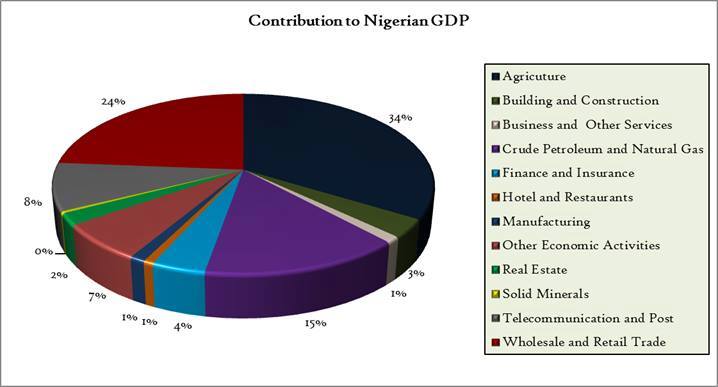There are no products in your shopping cart.
| 0 Items | £0.00 |


Ayo Akinfe
[1] So the naira strengthens slightly against the dollar again, trading at around N450 as the Central Bank of Nigeria keeps releasing more foreign currency, ending the scarcity
[2] As more dollars are available, businesses can now import produce and multinational firms operating in Nigerian can change and repatriate their profits. This may be the beginning of some sort of confidence returning to the Nigerian economy
[3] This availability of dollars also means that the cost of imported goods has fallen. With the cost of imported foodstuffs like rice, sugar, palm oil and wheat falling, inflation has stopped rising. Within two years, inflation rose to 19% from 9%, putting an unbearable strain on Nigerian workers. When the minimum wage has remained stagnant at N18,000 and inflation suddenly rises by 10%, it is easy to see why life has got harder
[4] Here is a pie chart, which offers a breakdown of the Nigerian economy into its component sectors. As you can see, manufacturing only accounts for 7% of gross domestic product (GDP). This for me is at the root of all our problems
[5] Do you know the global average with regards to manufacturing as a percentage of GDP is 30%. When we only have about one quarter of that, you can see why we are in trouble
[6] In China, manufacturing as a percentage of GDP is a whopping 40% and in developing economies similar to Nigeria such as Indonesia, Mexico, Iran and Brazil, it is 47%, 34.2%, 40.6% and 27.4% respectively
[7] Nigeria currently has a GDP of $550bn. If we can double the contribution of manufacturing as a percentage of GDP, I think we can easily boost that figure to $1trn
[8] No matter how many dollars you throw at the naira, any respite is temporary as ultimately, the strength of your economy is what really determines the value of your currency. We import so much that any vagaries in the global currency market automatically has an inflationary impact on Nigeria
[9] We have a lot to leverage on as we can use agriculture as a basis to manufacture agri-based products. We also have enough solid minerals to began manufacturing finished industrial goods like pipe rods, machine tools, ball bearings, etc. We also have enough oil and gas to become a major player in the global petro-chemicals industry
[10] We simply need to get Nigeria manufacturing to move on to the next rung of the ladder. I am hopeful that this new gas-fired industrial park in Delta State will be the catalyst for the Nigerian industrial revolution. We need the margins from manufacturing to offset the volume of imports, to increase our export earnings from the current $50bn to around $100bn and to end the dependency on oil. In all the other sectors, the margins are simply not high enough to have a dramatic effect on the economy.